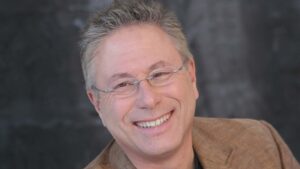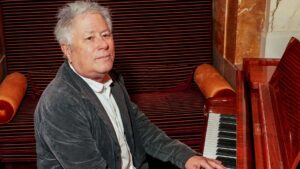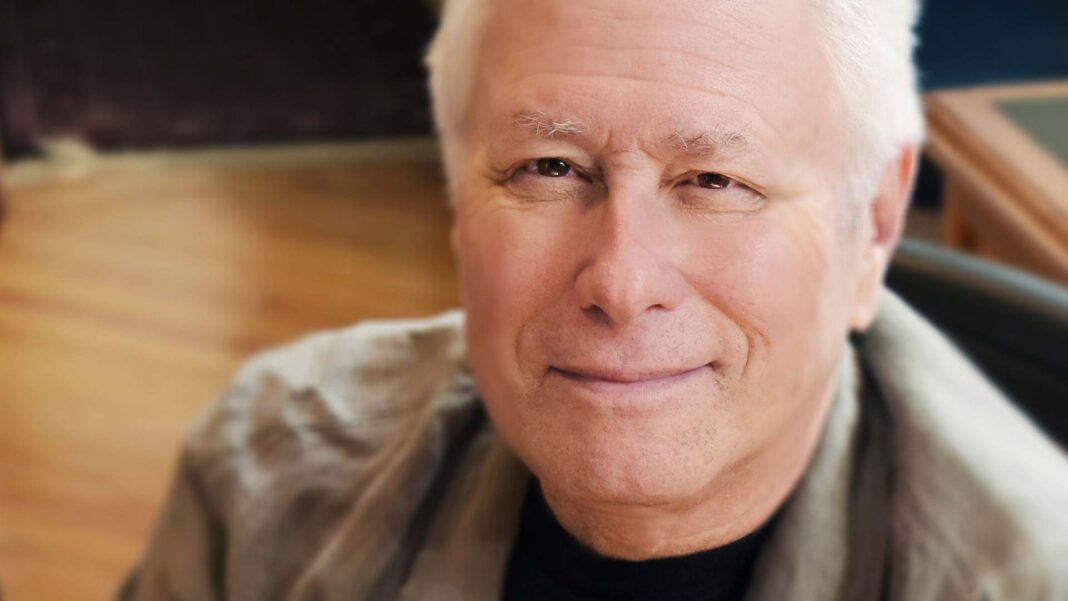THIS IS THE NINTH OF OUR BEST OF 23 REVIEW OF INTERVIEWS: If I were to ask you what Little Shop of Horrors, The Little Mermaid, Beauty and the Beast, Aladdin and Pocahontas have in common, you would probably say they all have songs written by Alan Menken. If I asked you what The Apprenticeship of Daddy Kravitz, The Honeymooners, God Bless You, Mr. Rosewater and Atina: Evil Queen of the Galaxy have in common, you might be stumped. But, they too, have songs written by Alan Menken.

Menken has won 8 Academy Awards, 1 Tony Award and 11 Grammy Awards. Fear not, he’s an EGOT with his winning of a Daytime Emmy Award for the song Waiting in the Wings which he co-wrote with Glenn Slater for Rapunzel’s Tangled Adventure. He’s had a variety of collaborators and by any measure a massively successful career.
He will be celebrating that career this weekend when he gives performances of his show A Whole New World of Alan Menken at the Mesa Arts Center in Mesa, Arizona on March 31st and The Soraya in Northridge, California on April 2nd.
Recently I spoke with Menken about his career. Rather than focus on the projects everybody knows (many of which are featured in his show), I opted to ask Menken about some of the lesser-known works of this remarkably successful composer (and sometimes lyricist). What follows are excerpts from our conversation that have been edited for length and clarity. To see the full interview (which includes him singing part of a beautiful song you’ve probably never before), please go to our YouTube channel.
I want to get your perspective on your work by asking you about a lyric that comes from one of the songs that you wrote. The lyrics go: “In the end, it’s only your voice matters. You never hear it, though, for free. You got to pay dues before you choose to be the man you’re going to be.” Those are David Spencer’s lyrics from The Man You’re Gonna Be from your musical adaptation of The Apprenticeship of Duddy Kravitz. At what point did you find your voice and become the man who created the work we’ve all grown to love?
I fell in love with music at a very young age. I was kind of just this kid who was a dreamer. I liked to just play at the piano. But I really hated to practice. I just hated schools. I just didn’t like where it was going. All the men in the family are dentists or doctors or whatever. So I would say that voice always lived inside of me.
When I was in college I went as a pre-med. I just didn’t want to go into the lecture hall. I just said no. I made a right turn and went to the piano practice room and just made music. I didn’t care. I would say my voice was found there. My voice is not my music. My voice is my love of music and my desire to make it in all the different forms. I take my voice from characters, from stories or from myself.
A Whole New World of Alan Menken began its life almost seven years ago in 2016. How has the show evolved?
For the most part, as I perform it, I really go back to the moment when I wrote them. Just the memories of where they came from. People say, “Oh, Disney composer Alan Menken.” I love Disney. I adore Disney. But I said I would like [the show] to be some medium in which it’s my career. Which contains Little Shop of Horrors or, as you said, The Apprenticeship of Duddy Kravitz or A Christmas Carol or Sister Act or A Bronx Tale or whatever it is. So it really came from wanting to share.
There’s a whole generation of people for whom you are so closely identified with Disney properties, whether they are on screen or on stage. I happen to be a little bit older than that. My first Disney reference is Robert and Richard Sherman. Is there any way in which they were influential on you or were part of your understanding of the Disney history when you started getting involved with Disney?
Obviously they are a big part of the history. To be honest, I go further back to the Disney films that set my imagination on fire like Fantasia. It was that marriage of classical music and images that just forever had me creating images in relation to music. Nobody was more welcoming to me when I came to Disney than Richard Sherman. Richard and [his wife] Elizabeth were so kind. I’ll never forget that.
Just before I started writing the Disney films the AIDS crisis was just this unbelievably horrifying specter that was killing our friends. By that time Tom [Eyen – Kicks: The Showgirl Musical], passed away. First it was Howard [Ashman – Little Shop of Horrors], then it was Tom. Before that it was Steve Brown [Battle of the Giants].

But leading into this time Anna had been born. [I was] bringing my daughter into this world that is fraught with this nightmare because none of us knew the extent of it or how it could be contained and how it was being treated. I would sit with her on the couch and all the Disney classics had come out on VHS. I was putting in Cinderella and Sleeping Beauty or Peter Pan and just sitting with her. Watching them and going this is the ultimate safe space in the world. You just felt it. I felt that from that material.
We are creating the ultimate safe space. We want to be emotionally true and to come from a place of love and redemption and belief in the beauty of life and everything. And so all of that informs, I guess, my approach to Disney.
What stands out to you most about your days at Sesame Street?
I was making a living. “We have an assignment for you.” Yay! 35 bucks. Yay! I can pay my rent. Literally. Sesame Street was a wonderful, safe space. Howard and I wrote a song which is called The Count’s Lament. “Why I can’t I say ‘w.’ I want to and wish that I could.” Oh, God. Howard’s brilliance. The most special part was being able to write something with Howard for Sesame Street.
I saw an interview you did with Michael Riedel around the time of Sister Act and you said, “I never let go of anything.” What relationship do you have with the works that haven’t been seen as much that maybe will someday have new opportunities?
Occasionally we would like to nudge them forward if there’s an opportunity. I remember [Music Director/Composer] Lehman Engel always used to say “What’s next?” I will always prefer to just move on to what’s next. I’ve learned that things come back on their own. I didn’t bring back Newsies. Newsies brought itself back. We would see it everywhere. People were just doing the songs from it.
Tom Schumacher [President of Disney Theatrical Group] said, “Look, we should do something. Just a a version for stock or amateur. Just so there’s something because people are cobbling together their own versions of Newsies.” If I sense an opportunity. I go for it.
You mentioned Duddy Kravitz. It’s a really well-written musical. At the same time it’s complex and it’s got a real darkness to it. Duddy is a conundrum because he is one tough, complicated character. It’s going to take context and an audience that really wants to dig into something that’s got some real guts to it.
There was a musical Howard wanted us to do a following Little Shop on stage. It was based on the movie The Big Street and we couldn’t get the rights at the time. He knew that he had a very finite amount of time. He wasn’t telling me at that moment. So I said, we’ll wait. After he passed away I did get the rights. I worked on that twice. But again, the genre, the story, the complexity of it, the the darkness of it, you have to really handle it in just the right way. I’ve learned not to try to force things. Somehow the time will come. I just am a believer in that.
If you dig deep enough on the internet you can find seven demos from The Honeymooners, which I think are some of the best songs that you wrote in your career.
Those are my music and lyrics. Before I met Howard I was exclusively composer and lyricist. We never got the rights to do it. I am very proud of that. Someday maybe we’ll get those songs out there again. People occasionally record the songs.
There’s a lot of there’s a lot of material that you’ve written that people don’t know unless they were lucky enough to be in workshops or to be at shows. I love the song Hero from Babe.
We have five songs from from Babe.
You have a song, Daughter of God, that you wrote for Emmylou Harris…
Atina: Evil Queen of the Galaxy. It was written for Divine. That one I am now actively reviving and hopefully getting that on stage.
You have such a wealth of material. It seems to me you probably have at least two two discs worth of material, probably more, that could be recorded so people can experience them. Is that something you would like to see happen?
Sure I would. My daughter Anna, who is a singer, songwriter and producer living in Nashville, one of the things she’s been discussing with me is she would love to have me open up the archives and either record it myself or get other people to record things. So it’s always a possibility that those things will get out there.
I think one reason I have had the success I’ve had is because I’m never resistant to throwing something out. Never. Generally the best thing will always rise to the surface. I’m just that kind of collaborator. It’s not about me. It’s about being part of something bigger and putting your talent out into that. That’s how you maximize your abilities.
I threw out a song I loved from the movie of Hercules. It’s called Shooting Star. Love that song. And then we wrote Go the Distance. We tossed out a song called We’ll Have Tomorrow from the second act of Little Shop of Horrors. But we didn’t need it. Part of its success is that tightness. I mean there are some shows where I’ve written 14 songs for one moment. Leap of Faith – it’s just like the most ridiculous archive of songs.
The Howard Ashman Archives published a two-part interview with you. I don’t know how long ago this was because there was no date on it. But you were asked about Howard and you said, “But I know honestly that he has remained my collaborator in so many ways in the over 20 years since he’s been gone.” Is that still true for you today? How do you feel his presence in your work today?
Occasionally he’ll just be in a dream where we’re writing together. Sometimes in your subconscious there’s almost an alternate arc of your life that’s happening on a subconscious level. When he passed. First of all, I had vivid dreams. I mean, literally on the moment he passed.
Please watch the clip below to see images of Howard and hear the next part of the story.
And then I went back to sleep and that’s when he had passed. Shortly after he and I met in the dream I said, “Tell me what happens. What happens when you die?” He sort of talked me through what his experience was, which was very interesting. Sometimes in the dream we’re writing something, but he’s saying “You’ve moved on. I can’t keep up with what you’re doing or I don’t want to.” I do have a visceral sense of him in my life. I just think in some ineffable way he’s a part of me. He’s just a really deep part of me.
When I think about the things we would have done. Howard wrote Smile. It was really a wonderful score. But people wanted it to be about a beauty pageant in a nice, light, kind of happy story. And it wasn’t. It was about the dark side of a beauty pageant. I was playing [Disney Fan Club Expo] D23. It was already planned that I was playing it. Marvin Hamlisch, who was Howard’s collaborator on Smile, passed away. I said I really should play Disneyland [a song from that musical]. I knew what Marvin and Howard had written for the basic song, but I wanted to sit with the lyric and kind of play what they had written, but put it in my own voice and my own fingers. I wanted to play this from my heart and it was the first time I had a lyric of Howard’s in front of me since he passed that I hadn’t worked with before. It just blew me apart, the memory of that, because he was just on an absolutely incredible level as a writer.
You said on New York Theater Talk that at various stages when you were growing up you wanted to be Beethoven, then the Beatles and then Bob Dylan. What’s been the most satisfying thing about being Alan Menken instead?

If I think about being me, to be honest, is that I’ve maintained. I’m the same person I was when I was struggling to write. Janice [his wife] and I are together over 50 years now. I talk to my daughters all the time. I’m dad. I love that. I know this thing… Well, Irving Berlin called it my little knack. I think that was his. My little knack is great. I love having it.
I was working on a new song for this Nancy Drew musical I’m writing and I get lost in them. I want to go someplace I’ve never been before. And I want to take an audience someplace they’ve never been before. I’m blessed that I move on. I think it’s a blessing to move on. Even with my concerts there are times I go, “Wow, I’m up here. I’m reliving the last how many years of my life?” 50 years. 50 years of my life. But I see how much it means to audiences and I kind of go there’s something here that’s special. What am I going to do if I’m not doing this one thing?
Because of what I’ve done in my life, I don’t really have hobbies. So this is kind of it. I’m going to do this or I’m just going to my feet up and I don’t know what am I going to do. You just love the craft, you breathe it in and then you breathe it out and you leave it to others to define what it is you do.
To watch the full interview with Alan Menken (complete with some singing), please go here.
Photos: Alan Menken (Photo by Shervin Lainz/Courtesy AMP Worldwide)













